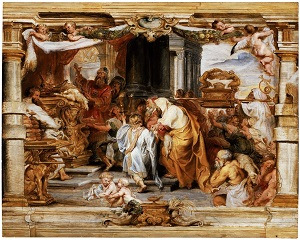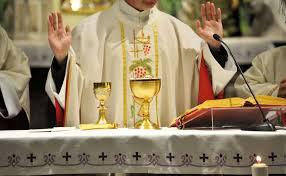The Profound Connection
Jewish Worship and the Holy Mass
by Dr. José Enrique Aguilar, SSD
This article is reprinted from the Spring 2022 issue of Imprint Journal, by the Sisters of Life.
Consider this:
A. Two Important Jewish Events
In Israel, there were two important moments in the religious life of the Jews:
- the reading of Scriptures
- the celebration of feasts, which included the celebration of a sacrifice.
Here are 3 major feasts and sacrifices of ancient Israel:
- Passover: [Pesach] The sacrifice of Passover, which celebrated the liberation from slavery in Egypt
- Covenant: [Shavuot] The sacrifice of Covenant, which celebrated the union between God and His people
- Atonement: [Yom Kippur] The sacrifice of atonement of sins, which aimed to restore the broken covenant by the people
The meaning of blood to the Jews:
 In these sacrifices, the most important element was blood, because blood was considered a gift from God, which meant life. Blood was holy and was used as a sign of salvation (Passover); it was sprinkled upon the altar and upon the people, to symbolize the union of both (Covenant); it was poured upon the altar, to purify the sins of the people (Atonement).
In these sacrifices, the most important element was blood, because blood was considered a gift from God, which meant life. Blood was holy and was used as a sign of salvation (Passover); it was sprinkled upon the altar and upon the people, to symbolize the union of both (Covenant); it was poured upon the altar, to purify the sins of the people (Atonement).
B. Same Two Important Events in the Mass Today
- the Liturgy of the Word
- the Liturgy of the Eucharist
We are present at the Last Supper.
As Jesus celebrated the Last Supper, He indicated that the offering of His life was:
- Passover: Connected with the sacrifice of Passover (Mk 14:12); indeed, Jesus is our "Passover lamb" (I Cor 5:7).
- Covenant: He said, "This cup that is poured out for you is the new covenant in My blood" (Lk 22:20).
- Atonement: He said that His blood is poured out "for the forgiveness of sins" (Mt 26:28).
 At Mass we are purified, united, and set free:
In the Liturgy of the Eucharist, Christians are set free from sin in order to live for God.
They are purified from sin and united with God as God's people — and even more, as children of God, as we say together the Our Father!
At Mass we are purified, united, and set free:
In the Liturgy of the Eucharist, Christians are set free from sin in order to live for God.
They are purified from sin and united with God as God's people — and even more, as children of God, as we say together the Our Father!
Even More.
At Mass we receive the very life of God:
The Liturgy of the Eucharist offers something more that was not contemplated in the sacrifices of the Old Testament: we receive the life of God.
Paul exhorts Christians "to offer your bodies as a living sacrifice, holy and pleasing to God" (Rom 12:1).
Hence, we can say that there is also a "liturgy of life" that follows as a consequence of the Liturgy of the Word and the Liturgy of the Eucharist.
Christians, having been nourished with the Word and the life of God, are to go and live their lives in union with Christ, offering their lives as Jesus did (cf. Heb 10:6-7).
Dr. José Enrique Aguilar, SSD, is an expert in biblical theology and a professor at Dunwoodie Seminary in New York.
|


 In these sacrifices, the most important element was blood, because blood was considered a gift from God, which meant life. Blood was holy and was used as a sign of salvation (Passover); it was sprinkled upon the altar and upon the people, to symbolize the union of both (Covenant); it was poured upon the altar, to purify the sins of the people (Atonement).
In these sacrifices, the most important element was blood, because blood was considered a gift from God, which meant life. Blood was holy and was used as a sign of salvation (Passover); it was sprinkled upon the altar and upon the people, to symbolize the union of both (Covenant); it was poured upon the altar, to purify the sins of the people (Atonement).
 At Mass we are purified, united, and set free:
In the Liturgy of the Eucharist, Christians are set free from sin in order to live for God.
They are purified from sin and united with God as God's people — and even more, as children of God, as we say together the Our Father!
At Mass we are purified, united, and set free:
In the Liturgy of the Eucharist, Christians are set free from sin in order to live for God.
They are purified from sin and united with God as God's people — and even more, as children of God, as we say together the Our Father!